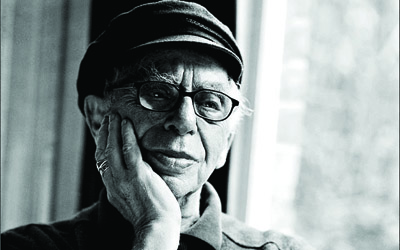
This is a personal response and not an obituary, and
I’m not claiming that I could count Bernard Kops as a friend. I read with
him at a Tribune
poetry reading in
Regent’s Park Library in London in 1969 and met him again in 2000 when we
shared a platform with Adrian Mitchell, Michael Horovitz and the composer
David Bedford in a tribute to Kenneth Patchen at Tate Modern. Kops talked
about discovering Patchen’s work in the late-1940s and meeting Charles Wrey
Gardiner who published him in Britain. Apart from those two occasions I knew
Kops through his plays, poems and prose works, in particular his memoir,
The World is a Wedding,
originally published by MacGibbon & Kee in 1963 and now on my shelves in the
form of a 1966 paperback edition from Mayflower-Dell.
It
tells the story of a young boy growing up in a working-class Jewish family
in the East End of London, experiencing it as limiting in what it had to
offer in terms of the imagination, and later finding his way to Soho and the
company of “Art students, artists, models and layabouts, all misfits like
myself”. It was Kops’ entry into the
bohemian world of the period, and it brought him into contact with
characters like “Ironfoot” Jack (he also appears in Colin Wilson’s
Adrift in Soho) and Iris Orton,
described by Kops as “A strange girl with a cloak who was a beautiful
poet.....in her wild cloak she went from cellar to cellar reading
apocalyptical verse to a new group of restless kids who had been spawned in
war”.
There’s a lot more in The World is a
Wedding, including trips to Spain and Tangier, bookselling from a barrow
in a side-street off Cambridge Circus, drugs, a breakdown (Kops told the
doctors about his catechism: “Long live Wilhelm Reich, Anarchy, Buddhism,
and the poetry of Lorca and
William Blake”), and occasional returns to the family fold. I’ve just picked
out one or two things, admittedly about the Soho scene of the late-1940s and
early-1950s. He went on to produce many plays, poems, novels, and memoirs.
The World is a Wedding
was reprinted
by Five Leaves Books in 2007. I mentioned “Ironfoot” Jack Neave and Iris
Orton and it may be worth referring to Neave’s
The Surrender of Silence : The
Memoirs of Ironfoot Jack; King of the Bohemians (Strange Attractor
Press, 2018) and Orton’s A Man
Singing (Scorpion Press, 1962). Orton was an early practitioner of
poetry-and-jazz performances. I recall seeing some of her poems in
Jazz Monthly but that would have
been in the 1960s when I was writing for the magazine.
And there is Wrey Gardiner whose
The Dark Thorn (Grey Walls Press,
1946) and The Flowering Moment
(Grey Walls Press, 1949) catch the mood of the moment when a writer like
Kenneth Patchen appealed to someone like Bernard Kops.